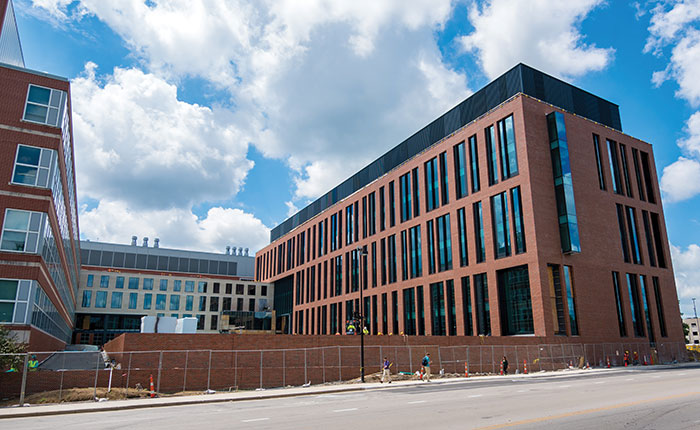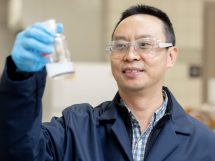
Complex health conditions have a devastating impact for more people in Kentucky than anywhere else in the United States. Kentucky ranks first in the nation in cancer deaths, fifth in overdose deaths and seventh in cardiovascular deaths.
 Built with state funding and university resources including private donations, the University of Kentucky opened the $265 million Research Building 2 in September 2018 and is organizing multidisciplinary research teams within this facility to tackle these complex problems.
Built with state funding and university resources including private donations, the University of Kentucky opened the $265 million Research Building 2 in September 2018 and is organizing multidisciplinary research teams within this facility to tackle these complex problems.
With six floors of biomedical research laboratories and three floors of researchers working across disciplines, this new facility will allow UK to harness intellectual capital to have the largest impact on Kentucky’s most pressing health problems. The research teams merge basic biomedical research, health services research, public health, behavioral sciences, bioinformatics and big data, economics and engineering and will focus on cancer, cardiovascular diseases, diabetes and obesity, and substance abuse.
“We are harnessing multidisciplinary research to create solutions for the Commonwealth’s most intractable problems,” UK Vice President For Research Lisa Cassis said. “Current experts at UK and top talent recruited to UK, working together in this new facility, will make important discoveries and work in and with communities to help Kentuckians live healthier lives.”
The building will house up to 100 principal investigators (PIs), who lead federally funded research projects. Fifty of these PIs will be current UK researchers, and 50 will be new recruits to UK. When complete, 500 people total will work in the new building.
Markey earns renewal of prestigious NCI designation
The National Cancer Institute recently renewed the University of Kentucky Markey Cancer Center as a NCI-designated center for the next five years.
The UK Markey Cancer Center remains one of only 70 NCI-designated centers in the country and the only one in Kentucky. Markey’s renewal as an NCI-designated cancer center includes a five-year grant projected at $10.8 million to support research, recruitment of faculty, education and clinical trials. The previous five-year grant from NCI helped Markey recruit dozens of new researchers and clinicians, pilot new research projects targeted at Kentucky issues, and launch precision medicine initiatives poised to change the standard of cancer care in the state.
“Earning NCI designation five years ago was both a recognition of our efforts up to that point, and a catalyst to do even more research, outreach, and clinical care for Kentucky and beyond,” said Markey Cancer Center Director Dr. Mark Evers. “With Kentucky still home to the highest cancer incidence and mortality rates in the nation, having access to the research-driven, high-acuity care an NCI-designated center offers is vital to our citizens. With this renewal, we will continue to push forward new efforts in cancer prevention, research and treatment options with the ultimate goal of conquering cancer in the commonwealth.”
In September 2017, Markey applied for NCI designation renewal, highlighting its accomplishments over the past five years and detailing its plans for cancer care and research for the next five. The renewal came with an improved overall score for Markey and a higher amount of projected funding from the NCI compared to the previous award.
Total research funding to Markey has increased 48 percent in the past five years; while NCI research funding during that same time has increased 24 percent. More than $2 million of that NCI funding comes from grants that are only available to NCI-designated cancer centers.
Since earning its initial NCI designation, Markey’s growth and impact on the commonwealth has been significant. Outpatient visits per year have increased more than 35 percent since 2012, and more than 55 percent since 2009 when the journey toward earning NCI designation began in earnest.
To help patients from all corners of the state receive the best possible care close to home, in the past five years the Markey Cancer Center Affiliate Network expanded from eight members to 20 members and counting. In fact, 59 percent of all new cancer cases in Kentucky are now directly or indirectly cared for by Markey via this network.
Markey’s clinical and research work is backed by the university, the Commonwealth of Kentucky, and philanthropy through the Markey Cancer Foundation. In the past five years, $215 million in institutional, state and philanthropic funds has supported the recruitment of cancer researchers and clinician scientists and the construction and renovation of clinical and state-of-the-art research space specifically for the oncology research and clinical programs at UK.
NCI designation grants are awarded for five-year periods.
Regional collaboration matches experienced entrepreneurs with university startups
The University of Kentucky Office of Technology Commercialization (OTC) continues to be a regional leader in commercialization through partnerships. Most recently, the office announced the launch of the Southeast Executives-on-Roster (XOR) and the Midwest Executives-on-Roster (XOR) platforms.
The Southeast XOR is a collaboration between 14 Southeastern Conference (SEC) universities and the Midwest XOR is a collaboration between 11 other Midwest universities. These universities have jointly created these online platforms to broaden access to experienced entrepreneurial talent and to match that talent to university-affiliated startups in need of executive management.
“Cities in the Southeast and Midwest have relatively fewer entrepreneurs and investors with specific industry talent and expertise,” said Ian McClure, director of the UK OTC. “To fill this need, SEC and Midwest universities are approaching this challenge cooperatively by filling a critical talent gap for early stage companies that will attract that capital. These universities are building an advantage by acting collaboratively to create a regionally affiliated network of entrepreneurial talent and a platform to match that talent to startup companies who are commercializing the intellectual property developed at these universities.”
By combining the entrepreneur talent networks of all participating universities, startup companies will have access to a larger talent pool whose members have been vetted by other SEC or Midwest universities. This will improve the likelihood that startups will find fundable executive management and, ultimately, success. Similarly, Southeast XOR and Midwest XOR entrepreneurs looking for their next opportunity will have a larger pipeline of opportunities available in a portal only accessible to those entrepreneurs who are members.
“UK has more than 600 worldwide patent assets, placing UK among the top 100 worldwide universities for patent grants,” UK President Eli Capilouto said. “Collectively, this work reflects a strong and diverse research enterprise that mirrors some of Kentucky’s most vital industries: drug development and design; energy; plant biotech and equine health; as well as innovative materials for medical devices, implants and drug delivery systems. This collaboration will enhance our efforts to bring creative solutions to market to improve the lives of those we serve.”
“In Kentucky, more than half of all basic, translational and applied university-led research happens at the University of Kentucky,” said UK Provost David Blackwell. “We are pleased to see this project provide opportunities to match university startup companies with talent and connections in key industries.”
“It is especially exciting for its potential to spearhead collaborations across participating universities,” said UK Vice President for Research Lisa Cassis.
UK will expand help for pregnant women with opioid use disorder in Rural Kentucky
The University of Kentucky will expand and improve treatment for pregnant women with opioid use disorder (OUD) in rural areas of Kentucky with a $4.9 million contract received in May from the Patient-Centered Outcomes Research Institute (PCORI).
The need for multidisciplinary comprehensive treatment for OUD was seen across multiple disciplines – members of the Department of Obstetrics and Gynecology and Department of Psychiatry in the UK College of Medicine, as well as faculty and staff in the UK College of Nursing, worked together to develop and launch the Perinatal Assistance and Treatment Home (PATHways) program.
PATHways integrates evidence-based knowledge through a comprehensive approach to perinatal OUD, offering buprenorphine maintenance treatment; neonatal abstinence syndrome reduction education; peer support; legal support; prenatal and post-natal health services for mother and baby; and health system navigation during delivery.
Since 2014, there has been significant success with the program, including fewer babies being diagnosed with neonatal abstinence syndrome (NAS) and more babies going home with their birth mothers.
In the study, funded with the PCORI contract, Dr. Agatha Critchfield, assistant professor of obstetrics and gynecology in the UK College of Medicine and medical director of PATHways, along with a multidisciplinary team, will compare two elements of the PATHways program in rural areas of Kentucky.
In one, women will attend pregnancy/parenting support and education groups led by a trained nurse and a peer support specialist every other week. In the other, women will have meetings via telemedicine with specialists in high-risk pregnancy, addiction care, pediatrics or substance counseling. The goal is for women to receive enhanced substance abuse care in their home communities.
The outcomes being examined are the long-term success of women in their recovery, the health of their babies and the continuation of the maternal-infant dyad.
“The PATHways program has seen great successes during the first three years that we have been in operation including reduced neonatal withdrawal, less maternal relapse and more infants going home with their mothers,” Critchfield said. “However, at this time, PATHways is only available at our main health care campus in Lexington and many patients with opioid use disorder reside great distances from our clinical home.”
The overall goal of the study is to address this health care epidemic where care is needed most and to define the optimal strategy to reach rural settings and improve perinatal substance abuse care throughout Kentucky, she said



















Add Comment